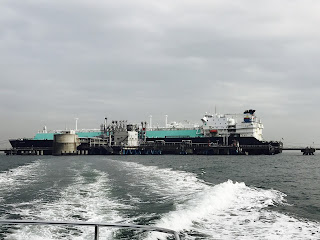
How do they control their feelings when they are always away from their family?
As a trainee (cadet), I did contracts of 6 months at sea. I found that it's a long stretch to be onboard and normally towards the last month I am tired and demotivated, just looking forward to go back home.
I personally feel that 3-4 months is a good period of time when we spend time working not for too long and not for too short.
However, leaving behind our loved ones and the constant feeling of missing them is an irrefutable fact and are often considered as the dark side of seafearing.
- Internet
We can't do what everybody does. We can only communicate with them via emails
- Satellite Phone
- Family Carriage
How do they feel while always being surrounded with water?
To be honest, it's an absolute bliss. Every single day I come up on the bridge and take over my watch to witness beautiful seascapes of serene oceans. It's a wonderful feeling waking up in the morning to find ourselves floating on a gargantuan piece of steel in the middle of nowhere. A freedom we experience at sea. A moment when we realise we are out and away from all the civilisations and societies that tell people what to do and how to live.
I always love ocean cruising significantly more than coastal navigation for many reasons and the above is undeniably one of it.
During coasting, the story is different. We see lands, mountains, islands en-route. Over and again we come across a lot of ships, barges, yacht and fishing boats resulting in traffic situations that demands cautious navigation. We encounter situations like this time and again.
With very little variety in life, doesn't they get bored?
Not really. We really don't have the opportunity to get bored and we simply don't have the time either. On a normal day at sea, I do two 4-hour watches (morning and evening) on the bridge.I spend 2 hours (not every single day) to take care of any monthly or weekly checks or the maintenance of any life-saving appliances. The rest of the time I'm off from work and indulge in relaxing and recreating myself with the whatever I have. It's limited, but trust me, it's good enough. These are the things we do onboard.
- Work out at the Gym. (Yes, we have one)
- Read books. (We have a library)
- Use internet. (We have free low speed internet onboard, 24/7)
- Watch movies. (We have a two TV saloon and a big collection of movies)
- Socialise with ship mates.
- Play video games. (We have an PS4)
- Play indoor games. (We have table-tennis, futsal etc)
- Enjoy the sumptuous meals.
We have zero-alcohol policy and there is no chance to get drunk on board, unless we choose to get sacked. Sailors drinking rum with breakfast might have sounded coherent a century back, but not any more. It's just another fallacy.
How are the dangers in their life (pirates, storms) and how frequently they face it?
- Storms and rough weather conditions.
Despite the above, I have experienced pretty rough sea conditions with high rolling and pitching which makes it really difficult to work and even to get a sleep
- Piracy
From our side, we perform the following.
a) Extra watches and look-outs are posted.
b) Anti-piracy drills are conducted. Gears are rigged and kept ready to use.
c) Anti-piracy offices are informed and we keep reporting our position every 6 hours.
d) Some vessels have armed guards onboard.





No comments:
Post a Comment